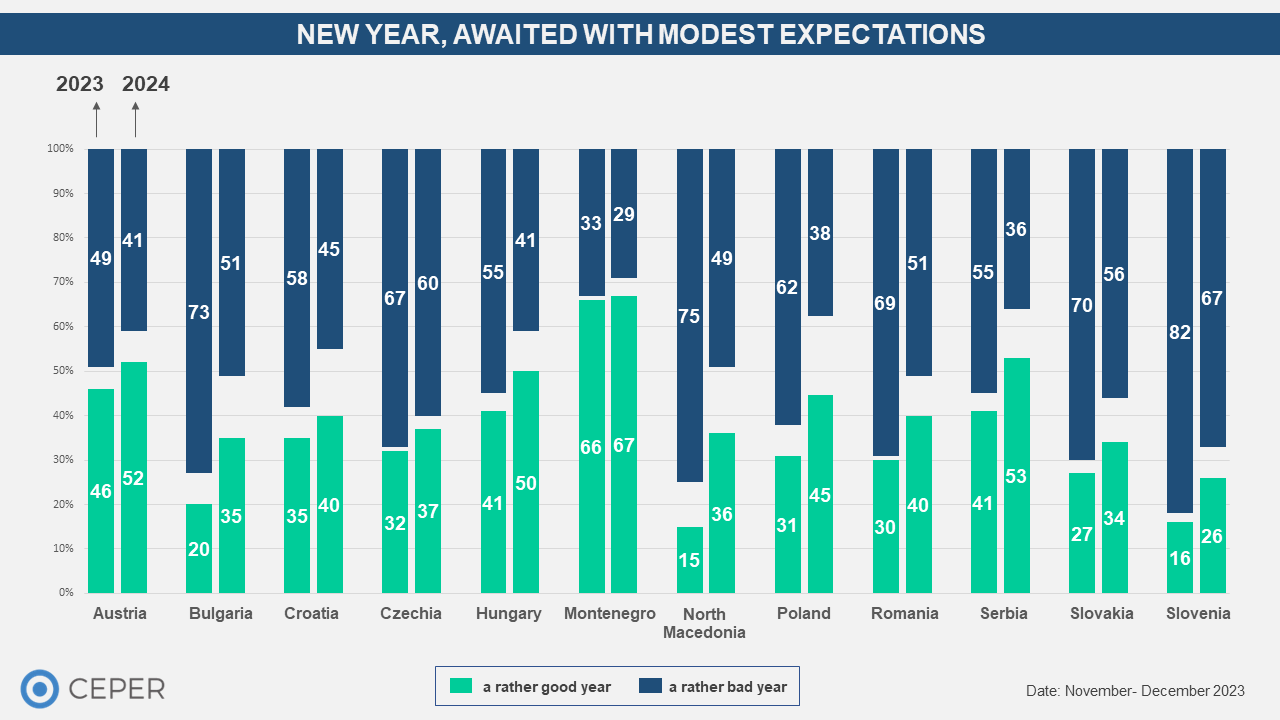New Year, Awaited with Modest Expectations
While over half of the respondents in 10 Central European countries had a pessimistic assessment of the year of 2023, 2024 is awaited with some modest optimism – in Austria, Hungary, Montenegro and Serbia the majority of the respondents believe that the coming year will be good for their country.
The much-awaited new year is associated not only with the new opportunities it may bring but also with the worries that are carried into the future from the past. With a turbulent year behind Central Eastern Europe marked with armed conflicts and economic uncertainty, the region awaited the new year with modest expectations. Inquiring the region’s perception of the past year and expectations for the year to come, CEPER conducted an opinion poll survey, asking whether respondents think that the year of 2023 has been rather good or bad for their country, and whether they expect the coming year to be rather decent or troublesome for the country of their origin.
Disillusionment marked the year Central Europeans left behind. Else than in Austria and Montenegro over half of the respondents considered the past year to have been rather bad for their country. In Serbia, Hungary, Croatia, Czechia, Poland, and Romania a strong majority, between 55-69% of respondents viewed the year of 2023 rather pessimistically. Slovakia, Bulgaria, North Macedonia, and Slovenia are the most disillusioned countries in the region, with over 70% of respondents saying that the past year has been rather bad for their nation. In Slovenia a staggeringly high percentage, 82% of survey respondents assessed the past year negatively – in other words, four fifth of Slovenes have a gloomy assessment of the past 12 months. Austria was the only surveyed country with a balanced view of 2023 – the past year was assessed to be good and bad by roughly equal number of respondents. Contrary to all the other countries mentioned so far, the small but future facing Montenegro was the only country that had an optimistic assessment of 2023 – 66% of Montenegrins considered 2023 to have been a rather good year.

While 2023 is viewed with much pessimism, 2024 is awaited with some modest optimism. In Austria, Hungary, Montenegro and Serbia the absolute majority, while in Poland the relative majority of survey respondents expected the new year to be rather good for their nations. Montenegro remained the most hopeful country on this metric too – 67% of Montenegrins expected 2024 to be rather good, which is a 15% higher result than in Austria. In Croatia and Romania 40%, while in Bulgaria, Czechia, North Macedonia and Slovakia between 30-39% of respondents expected the new year to be decent for their countries. Slovenia remained the most pessimistic country on this estimate too, as only 26% of respondents said that the coming year will be good, while 67% had gloomy expectations. In other words, in 11 of the studied countries at least one in three respondents hope for a good year in 2024.
In each surveyed country considerably fewer respondents expected 2024 to be a bad year for their countries, than how many considered 2023 to be a rather troubled year. In Poland, for instance, 62% of respondents viewed 2023 with disillusionment, while only 38% forecasted 2024 to be a poor year (whereas 45% expected a good year). In North Macedonia and Bulgaria too, the respondents giving a gloomy account decreased by over 20% when asking about the future. In Serbia, Romania, and Slovenia 19-15%, in Hungary, Slovakia and Croatia 14-13% less respondents expected the new year to be troublesome, than how many assessed the outgoing year sceptically. In Austria 8%, while in Czechia 7% less respondents made disillusioned forecasts about 2024 than how many negatively assessed 2023. In other words, while expectations are restrained in the region, 2024 is awaited with some modest optimism.
Methodology
The opinion-poll survey was carried out in 12 countries in the Central European region: Austria, Bulgaria, Croatia, Czech Republic, Hungary, Romania, Serbia, Slovakia, Slovenia, North Macedonia, Montenegro and Poland. The data were collected between 20 November and 21 December 2023. The survey was conducted by telephone (in person in Serbia and Montenegro) with 1 000 respondents per country. The sample per country is representative by gender, age and type of settlement.
About us
CEPER is the brand of CEPER Group GmbH. The CEPER acronym abbreviates Central European Perspectives. CEPER's area of expertise is Central European affairs, the company offers media monitoring, market research and opinion polls from the region to its clients.